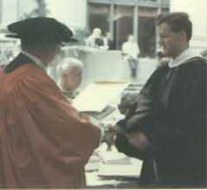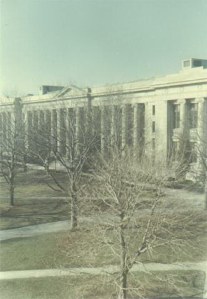
Law and its many connections -- law and literature, love, lollipops, & fun, law and everything else under the sun
Notes: 1) LawAndEverythingElse.Com & BurtLaw.Com don't solicit business for any law firm or give legal advice, other than that lawyers may be hazardous to your health. There are many more bad ones than good ones. Who can find a virtuous lawyer? Her price is far above rubies. It is easier for a camel to pass through a needle's eye than for a lawyer to inherit the Kingdom of Heaven. So saith the Lord. 2) In linking to another site or source, we don't mean to say we necessarily agree with views or ideas expressed there or to attest to the accuracy of facts set forth there. We link to other sites in order to alert you to sites, ideas, books, articles and stories that have interested us and to guide you in your pleasure-seeking, mind-expanding, heart-opening, soul-satisfying outer and inner travels.
BurtLaw's Harvard Law School
|
|
BurtLaw.Com
|
- LawAndEverythingElse.Com - Copyright (c) 2006 Burton Randall Hanson
|
Copyright (c) 2003 Burton Randall Hanson
First thing first: You may think you've left Harvard, but you haven't really. I don't know if you take Harvard with you, or if it follows you, or if somehow you are able to travel back there in time, whenever you want, and that more and more you find yourself doing it often, or if, as T. S. Eliot put it, you eventually arrive back where you started and "know the place for the first time."
If you'd asked me back on Commencement Day, June 12, 1967, as I was shaking Dean Griswold's hand in front of Langdell Hall while my mother was taking a picture that made us look like old buddies, I'd have said I had a love-hate relationship with the place, that the hate maybe exceeded the love, and that, in any event, it was time to move on. A few years later, however, I might  have quoted Robert Frost and told you I had "a lover's quarrel" with the place. That was about the time I wrote a letter to Professor Paul Bator, my professor in civil procedure and in administrative law, a bright, electric presence if there ever was one, and told him the truth, that often I found myself thinking of him and appreciating his teaching.
have quoted Robert Frost and told you I had "a lover's quarrel" with the place. That was about the time I wrote a letter to Professor Paul Bator, my professor in civil procedure and in administrative law, a bright, electric presence if there ever was one, and told him the truth, that often I found myself thinking of him and appreciating his teaching.
 have quoted Robert Frost and told you I had "a lover's quarrel" with the place. That was about the time I wrote a letter to Professor Paul Bator, my professor in civil procedure and in administrative law, a bright, electric presence if there ever was one, and told him the truth, that often I found myself thinking of him and appreciating his teaching.
have quoted Robert Frost and told you I had "a lover's quarrel" with the place. That was about the time I wrote a letter to Professor Paul Bator, my professor in civil procedure and in administrative law, a bright, electric presence if there ever was one, and told him the truth, that often I found myself thinking of him and appreciating his teaching. When I was still at Harvard some students published a collection of brief essays they'd written "in praise and blame" of Harvard. If I were to write one now, the praise would exceed the blame, and most but not all of the blame would focus on myself. My daughter--who is a junior at Harvard College and, as Professor Kingsfield would say, "thinks like a lawyer" (something she did when she was barely walking)--asked me why I'd blame myself. The answer is, as my old friend, Howard P. Walthall, '67, himself now a distinguished professor of law and legal historian, will tell you, I was pretty damn immature then (and, I hope, still am). I was worried about being drafted. I was a failure in romance. Like "Hart," in The Paper Chase, I was from Minnesota but, alas, I was no Hart. And so on. The fault was me more than in Harvard.
James Hillman, the noted depth psychologist, has written brilliantly about the need to think about and work through one's experiences, to retell one's stories and listen to what they say. Lately, partly because my daughter is planning on attending law school somewhere, I've been listening more to Harvard and to my many stories connected with it.
I've been hearing things:
1. Recently, for some reason, I heard the voice of Professor Andrew Kaufman (Justice Cardozo's biographer and Harvard hockey fan), in the course in commercial transactions, teaching me in one of those "teachable moments" about, not commercial transactions but of all things, legal ethics. And I wrote him a letter and told him and thanked him. Robert Frost wrote: "One can safely say after from six to thirty thousand years of experience that the evident design is...it will always be about equally hard to save your soul...." Don't do your "lawyering" in moral isolation, is what I think Prof. Kaufman was telling us. And it's what the great poet/great lawyer Wallace Stevens was getting at when he said in one of his letters: "[O]ne is not a lawyer one minute and a poet the next....I don't have a separate mind for legal work and another for writing poetry. I do each with my whole mind."
2. Sometimes I think of Professor Archibald Cox walking with his breakfast tray and sitting down with some students in Harkness Commons Dining Room the morning after Congress expelled Rep. Adam Clayton Powell and wondering out loud if they could do it (it turned out they couldn't). Whenever I think of that incident, I also  remember something he said once about one's being able to serve the public even in private practice. I've served the public working as an aide to the Minnesota Supreme Court for over 25 years, but as you enter practice, be it in the public or private sector, you should recall what Professor Cox said. Just as your soul is always in need of being saved, so, as William James put it, "Civilization is always in need of being saved," and you, as lawyer-citizen, can help save it:
remember something he said once about one's being able to serve the public even in private practice. I've served the public working as an aide to the Minnesota Supreme Court for over 25 years, but as you enter practice, be it in the public or private sector, you should recall what Professor Cox said. Just as your soul is always in need of being saved, so, as William James put it, "Civilization is always in need of being saved," and you, as lawyer-citizen, can help save it:
 remember something he said once about one's being able to serve the public even in private practice. I've served the public working as an aide to the Minnesota Supreme Court for over 25 years, but as you enter practice, be it in the public or private sector, you should recall what Professor Cox said. Just as your soul is always in need of being saved, so, as William James put it, "Civilization is always in need of being saved," and you, as lawyer-citizen, can help save it:
remember something he said once about one's being able to serve the public even in private practice. I've served the public working as an aide to the Minnesota Supreme Court for over 25 years, but as you enter practice, be it in the public or private sector, you should recall what Professor Cox said. Just as your soul is always in need of being saved, so, as William James put it, "Civilization is always in need of being saved," and you, as lawyer-citizen, can help save it: The nation best above all nations is she in whom the civic genius of the people does the saving day by day, by acts without external picturesqueness; by speaking, writing, voting reasonably; by smiting corruption swiftly; by good temper between parties; by the people knowing true men when they see them, and preferring them as leaders to rabid partisans or empty quacks.
3. You must have heard of Professor W. Barton ("Bart") Leach of Rule-Against-Perpetuities fame. He was my teacher and I was a member of his "club." If his portrait hangs in perpetuity somewhere at Harvard, I hope it's not a formal portrait but an enlargement of the cartoon caricature that Charlie Sherwood drew of him for the 1966 yearbook, a cartoon that captures the Leach whom Justice Felix Frankfurter referred to affectionately as "fractious child." Often I think of Bart Leach telling us in first-year property that when an opponent asks a rhetorical question, we should "answer it," that 99 times out of a hundred you can do so. That little bit of advice comes in handy in practicing law but also in listening to political rhetoric. Leach's course was more than a course in property law. I think of his classroom eulogy of Cole Porter, the law school dropout, the day after he died, or his classroom eulogy of Justice Frankfurter and his recounting his last visit with him ("...and then he told me who should replace Erwin as Dean"). But mostly I think of him playing the accordion and singing silly songs he'd written about the law. I think I hear him telling you: Don't forget to create some fun. Or as Fred Rodell, a professor at that other law school, wrote: "In Jeffersonian pursuit/ Of happiness, no disrepute/ Inheres. Pursue it./ Squander, don't hoard for some hereafter/ Your gifts of grace and love and laughter."
4. I was talking recently with my daughter, the afore-mentioned Harvard junior, who was complaining that there still aren't as many women teachers in college as there should be. I realized in talking with her that I had had only one woman as a teacher in college and none in law school. Only about five percent of the people in my law school class were women. I think it was unfortunate for them that things were the way they were, but I think it was unfortunate for me too. Robert Bly, the poet, has reminded us that boys need lots of male role models and mentors as they grow up, but I think boys and girls and young men and women need lots of male and female role models and mentors.
During my first year at the law school, I got a sense of what a mentor could mean when I heard Professor John Mansfield's moving eulogy of Felix Frankfurter (for whom he had clerked) in the formal ceremony in the courtroom at Austin Hall and also when I listened to Professor Mark DeWolfe Howe (who, like Leach and others, had clerked for Justice Holmes) talk about Holmes in his class on Developments of Legal Institutions.
I had no mentors in law school, but I've had more than my share of them since. I remember asking the late C. Donald Peterson, the Justice for whom I clerked for two years at the Minnesota Supreme Court, if he had a glossy photographic portrait he would sign for me. On it he wrote, "To my friend and colleague, Burt Hanson." He was my first mentor in the law -- and, like all mentors, he was a mentor in other things that matter, like living life with joy in the face of oncoming death (something he did for nearly 20 years after being diagnosed as suffering from non-Hodgkins lymphoma).
I've had a number of mentors since, and I'll let you in on two little secrets: First, they're not that hard to find. In my experience, people like to be mentors. You have to give them the opportunity. Second, it's never too late to find them. I'm still finding them.
Moreover, if you're a reader, you can find mentors in books. In the years since I left Harvard I've done lots of reading, not just in the law. I wasn't always listening when Professor Howe talked about Holmes and yet it turns out I was, because I've become, as Howe was, a lover of Holmes, of Holmes the man, of his opinions, of his letters, of that great portrait of him that hung then in Langdell Hall in the library, the portrait under which I often found myself either daydreaming or staring at some attractive female student from nearby Lesley College who was studying there. If you read The Holmes-Laski Letters, one of the best books any young or middle-aged or old lawyer can read, you'll find the great Holmes, who was Laski's mentor and father-figure, becoming your mentor. Holmes once referred to his law clerks as "my sons at law." If he were alive today, he'd be referring to them as his sons and daughters at law. You still can be his son or daughter at law -- and at literature, for he is a literary stylist as well as guide of the highest order.
Oscar Wilde said, "In America, the young are always ready to give to those older than themselves the full benefit of their inexperience." Although it's nearly 30 years since I left Harvard, I still feel too inexperienced and immature to give you, my new friend and colleague in the great adventure of the common law, much personal advice as you enter the practice. Professor Paul Freund once referred to the "voices over one's shoulder," the teachers and others who stay with you wherever you go and continue to speak to and with you. These voices, not mine, are the voices you should listen to. My basic advice is simply to keep yourself open to hearing those voices. Listen to them now if you didn't listen to them in law school. They're still speaking to you and will continue doing so.
If you listen hard enough, you might even hear, with me, some of my old teachers: kind Donald Trautman patiently teaching trusts and conflicts of law; elegant Milton Katz, of Marshall Plan fame, talking torts with us as if we were equals; Alan M. Dershowitz, "the Dersh" (I had him the first year he taught when he was just 25 years old!); the dapper A. James Casner telling us to call him if we ever were presented with a certain difficult estate planning problem and needed to know his little "secret" on how to handle it; or Louis Loss and James Chadbourne, whose standing-room-only classes on corporations and evidence were so good I attended them even though I wasn't registered to take them. I wish even more you could hear the voice of "Little Wash" Washington, the buildings-and-grounds employee who befriended me and bought me milkshakes at Harkness Commons and invited me to his house for Christmas in 1966 when I was having some personal troubles, or the booming voice of "Kelly," the guy who served me "Gainesburgers" at Hark every night and always cheered me up with his friendly small talk. And the voices of my classmates and friends, especially "Walth" and "McMahon."
Keep yourself open. Don't stop listening and learning. Your Harvard education isn't over; it has just begun.
Announcement. We've finally gotten around to launching our new webzine/blawg: BurtLaw's The Daily Judge:
It is not an online newspaper and is not affiliated with or intended to be mistaken for any existing or previously-existing newspaper or journal. Rather, it is a so-called "blawg," a law-related personal "web log" or "blog," one with a subjective, idiosyncratic, and eccentric sociological and social-psychological slant that focuses not on the latest judicial decisions of supposed great importance but on a) the institution of judge in the United States and in other countries throughout the world, b) the judicial office and role, c) judicial personalities, d) the great common law tradition of judging as practiced here and throughout the world, e) judges as judges, f) judges as ordinary people with the usual mix of virtues and flaws, etc. We link to newspapers and other sources in order to alert the reader to ideas, articles, stories, speeches, law books, literary works and other things about "judges" that have interested us and that may interest the reader.
We don't promote our blawgs, but readers of this blog and of our affiliated political opinion blog, BurtonHanson.Com, may be interested in it. We don't think there is another blawg quite like it.